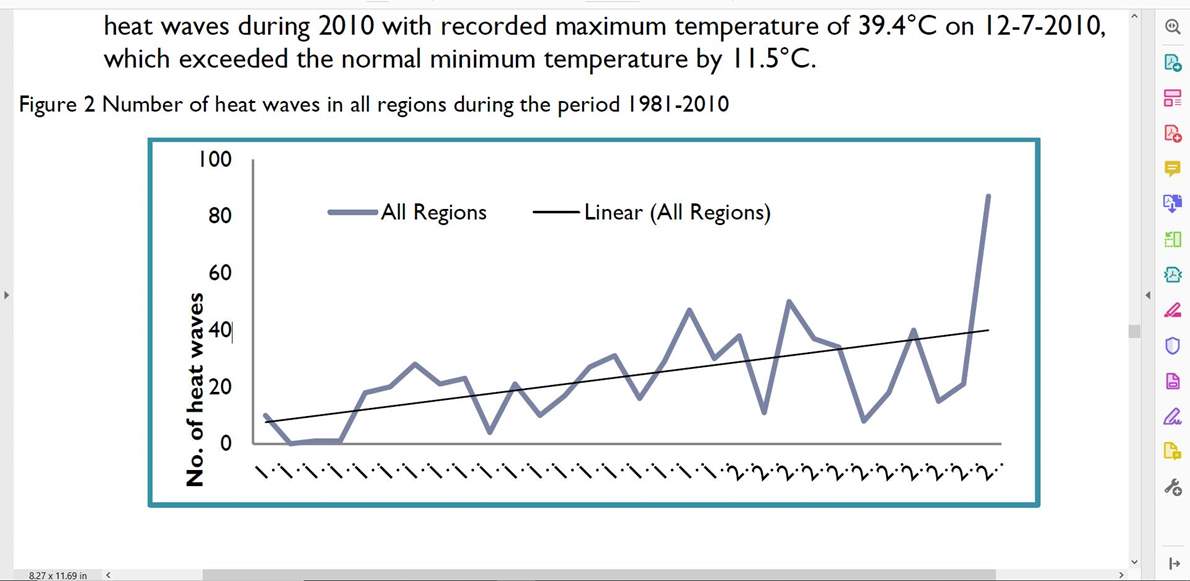AMMAN
— During the summer, Jordan is known for its relenting heat, with July being on
average the hottest month of the year. For the most part, the weather may not
be too hot, but every few days there can be unbearable heat. These are called
heat waves.
According
to the Ministry of Health, the number of heat waves across Jordan has steadily
increased since 1981 as climate change has affected the globe.

اضافة اعلانNumber of Heat Waves in all Regions of Jordan during the
Period 1981-2010 (Photo: handout)
Other
than the heat being uncomfortable, there may be serious health implications as
well, primarily heatstroke.
Heatstroke, according to the Mayo Clinic, is
defined as a condition in which your body overheats due to physical exertion in
or prolonged exposure to high temperature. The most serious form of heatstroke
occurs when your body temperature increases to 40°C.
The
ministry reported Amman having as high as 140 cases of heatstroke in 2008 and
went on to state that the most vulnerable people were children under the age of
5, adults over the age of 65, and pregnant women.
Symptoms of heatstroke include
- Body temperature of 40°C
- Altered mental state (e.g., confusion, agitation, slurred speech, irritability, etc.)
- Nausea and vomiting
- Flushed skin
- Rapid, shallow breathing
- Fast heart rate
- Throbbing headaches
- Coma, seizures, and even death in serious cases
Preventing heatstroke
From
a health perspective, there are many ways to prevent heatstroke since heat waves
are predictable. Some things you can do to prevent heatstroke may seem like
common sense, such as drinking plenty of water, wearing loose fitting and light
weight clothing, and avoiding strenuous activities during the hottest parts of
the day. But, there may be other things to take into consideration when trying
to prevent against heatstroke that may not be as obvious.
There
are certain diseases and medications that can make you more susceptible to
heatstroke. People with inflammatory diseases such as rheumatoid arthritis,
certain cancers, or even viral and bacterial infections may have an increase in
body temperature and in combination with heat can be at high risk for
heatstroke. Furthermore, certain drugs such as antibiotics, medication that treats
high blood pressure and seizures, and even certain vaccines such as diphtheria,
tetanus & acellular pertussis (DTaP) or pneumococcal vaccines can increase
body temperature.
How to stay cool at home
Staying
cool during these hot summer days is the most important and effective way to
prevent heatstroke. Air conditioning units (AC) are simple and often come with
a remote to control climate settings. The biggest drawback to AC units are
their prices, typically costing around JD300, as well as monthly electric cost
and maintenance when need be.
Alternatively,
and more commonly used, are fans. They work by circulating air and removing
heat from the surface of your skin. Even though they may cost less to purchase
and operate, fans are typically inferior to AC units since they do not
physically cool the room. Fortunately, there are tips on optimizing your fan. The
most important goal for optimizing your fan is reducing drag and other
friction. This means cleaning dust out of the fan regularly, tightening any
loose parts and oiling moving parts.
There
are other methods that do not involve the use of fans or AC to cool your house,
including:
- Limiting stove use during the day
- Unplugging devices and appliances that are not in use
- Switching from incandescent light bulbs to LEDs
- Turning on bathroom vents
Furthermore,
there are routines that can be performed around the house to maintain a cool
climate during the day. Start by opening the windows in the evening to expel
warm air and allow cool air to enter. The following morning, close the windows
to trap the cool air inside and close the curtains or shades on your window. Although
natural light is nice, having too much sunlight entering your house can drastically
increase the temperature.
Above
all else, remember to drink lots of water and stay out of the sun for extended
periods of time to avoid sun stroke during the heat waves.
Read more Health







